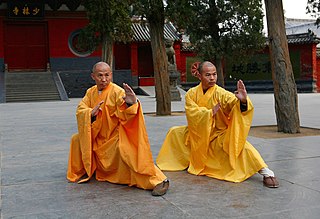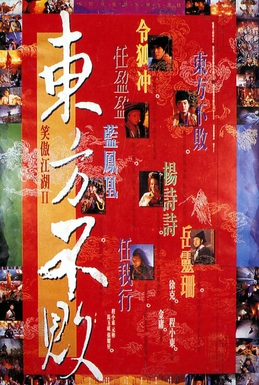Related Research Articles

Wuxia, which literally means "martial heroes", is a genre of Chinese fiction concerning the adventures of martial artists in ancient China. Although wuxia is traditionally a form of historical fantasy literature, its popularity has caused it to be adapted for such diverse art forms as Chinese opera, manhua, television dramas, films, and video games. It forms part of popular culture in many Chinese-speaking communities around the world. Chinese martial arts actor Jet Li is particularly noted for his contribution to making new Wuxia films popular internationally during his career.

The Smiling, Proud Wanderer is a wuxia novel by Jin Yong. It was first serialised in Hong Kong in the newspaper Ming Pao from 20 April 1967 to 12 October 1969. The Chinese title of the novel, Xiao Ao Jiang Hu, literally means to live a carefree life in a mundane world of strife. Alternate English translations of the title include The Wandering Swordsman, Laughing in the Wind, The Peerless Gallant Errant, and The Proud and Gallant Wanderer. Another alternative title, State of Divinity, is used for some of the novel's adaptations.
The Ming Cult is a fictional cult and martial arts school featured in the wuxia novel The Heaven Sword and Dragon Saber by Jin Yong, first published in serial form from 1961 to 1963. It is also briefly mentioned in The Legend of the Condor Heroes, another novel also by Jin Yong. It is loosely based on Manichaeism, an actual gnostic religion which originated in Persia in the 3rd century CE and later spread to other parts of the world, including China. The cult's headquarters is at Bright Peak in the Kunlun Mountains and it has several other bases spread throughout China. Its most powerful skills are the "Heaven and Earth Great Shift" and the "Martial Arts of the Holy Flame Tablets".
Dugu Qiubai is a fictional character who is mentioned by name in three wuxia novels by Jin Yong. He does not appear directly in any of the novels because he lived in an era long before the events of the novels took place. Nicknamed "Sword Devil" to reflect his prowess in and devotion to the practice of swordplay, he attains the philosophical level of "swordsmanship without a sword", which means that he uses swordplay techniques in combat without the physical existence of a sword.

Sword Stained with Royal Blood is a wuxia novel by Jin Yong. It was first serialised in the Hong Kong newspaper Hong Kong Commercial Daily between 1 January 1956 and 31 December 1956. Since its first publication, the novel has undergone two revisions, with the latest edition being the third. Some characters from the novel play minor roles or are simply mentioned by name in The Deer and the Cauldron, another of Jin Yong's novels.

Swordsman II, also known as The Legend of the Swordsman, is a 1992 Hong Kong wuxia film very loosely adapted from Louis Cha's novel The Smiling, Proud Wanderer. It was the second part of a trilogy: preceded by The Swordsman (1990) and followed by The East Is Red (1993). Directed by Ching Siu-tung, Swordsman II starred Jet Li, Brigitte Lin, Rosamund Kwan and Michelle Reis in the leading roles. None of the original cast from the previous film return except Fennie Yuen.

The Swordsman, also known as Swordsman, is a 1990 Hong Kong wuxia film. King Hu was credited as the director but allegedly left the project midway, and the film was completed by a team led by producer Tsui Hark. The film is loosely adapted from Louis Cha's novel The Smiling, Proud Wanderer. The film was followed by two sequels: Swordsman II (1992) and The East Is Red (1993).
Zhu Meichuo, known by her title Princess Changping, was a Chinese princess of the Ming dynasty. She was one of the children of the Chongzhen Emperor and Empress Zhou.

Sword Stained with Royal Blood is a 1981 Hong Kong film produced by the Shaw Brothers Studio, directed by Chang Cheh and starring the Venom Mob. The film was based on the novel of the same name by Louis Cha. The film was one of the rarest Venom martial arts film available, and has been digitally remastered and released by Celestial Pictures.

Dongfang Bubai, literally "Invincible East", is a fictional character in the wuxia novel The Smiling, Proud Wanderer by Jin Yong. He is the leader of the Sun Moon Holy Cult (日月神教), an "unorthodox" martial arts school. In his quest to dominate the wulin, he castrated himself to fulfil the prerequisite for learning the skills in a martial arts manual known as the Sunflower Manual (葵花寶典), and became a formidable martial artist after mastering those skills. His castration and supreme prowess in martial arts make him one of the most memorable characters in Jin Yong's wuxia universe even though he appears in only one chapter of the novel. His name has also become virtually synonymous with homosexuality and LGBT sexual orientations in Chinese popular culture.
The Shaolin School is a fictional martial arts school mentioned in several works of wuxia fiction. It is one of the largest and best-known orthodox schools in the wulin. Its base is in Shaolin Monastery, Henan, China. It is also sometimes referred to as "Shaolin Monastery" or "Shaolin Temple" instead of "Shaolin School".
The Wudang School, sometimes also referred to as the Wu-Tang Clan, is a fictional martial arts school mentioned in several works of wuxia fiction. It is commonly featured as one of the leading orthodox schools in the wulin. It is named after the place it is based, the Wudang Mountains.
The Ancient Tomb School is a fictional martial arts school in the wuxia novel The Return of the Condor Heroes by Jin Yong. It plays a significant role in the early development of the protagonists, Yang Guo and Xiaolongnü. It was named after its base, the Ancient Tomb (古墓) in Mount Zhongnan.
The Emei Menpai (峨嵋門派) is a fictional martial arts school mentioned in several works of wuxia fiction. It is commonly featured as one of the leading orthodox schools in the jianghu. It is named after the place where it is based, Mount Emei.
The Five Mountain Sword Schools Alliance is a fictional alliance formed by five "orthodox" martial arts schools in the wuxia novel The Smiling, Proud Wanderer by Jin Yong. The five schools specialise in swordplay and are based on the Five Great Mountains in Taoism: Mount Hua, Mount Tai, (South) Mount Heng, (North) Mount Heng and Mount Song. The alliance was initially established to counter the "evil" Sun Moon Holy Cult. However, as the story progresses, the alliance ultimately disintegrates due to mutual distrust and infighting.

State of Divinity is a Taiwanese television series adapted from Louis Cha's novel The Smiling, Proud Wanderer. It was first broadcast on CTV in Taiwan in 2000.
Swordsman is a 2013 Chinese television series adapted from Louis Cha's novel The Smiling, Proud Wanderer. The series is written and produced by Yu Zheng, and stars Wallace Huo, Joe Chen, Yuan Shanshan, Chen Xiao and Yang Rong. Shooting started on 24 March 2015 in Xiandu, Jinyun County, Lishui, Zhejiang. It was first aired in China on Hunan Television from 6 February to 4 March 2013. The plot deviates significantly from the novel, with Dongfang Bubai depicted as a woman and having a romantic affair with Linghu Chong.

Word Of Honor, previously titled A Tale of the Wanderers (天涯客), is a 2021 Chinese costume streaming television series co-produced by Ciwen Media, and Youku, directed by Cheng Zhi Chao, Ma Hua Gan, and Li Hong Yu, written by Xiao Chu, adapted from the danmei novel "Faraway Wanderers" (天涯客) by Priest. It starred Zhang Zhehan and Gong Jun in the leading roles. The series aired on Youku from February 22 to May 5 with 36 episodes, plus a short bonus clip shows what happened after the end of the main series.